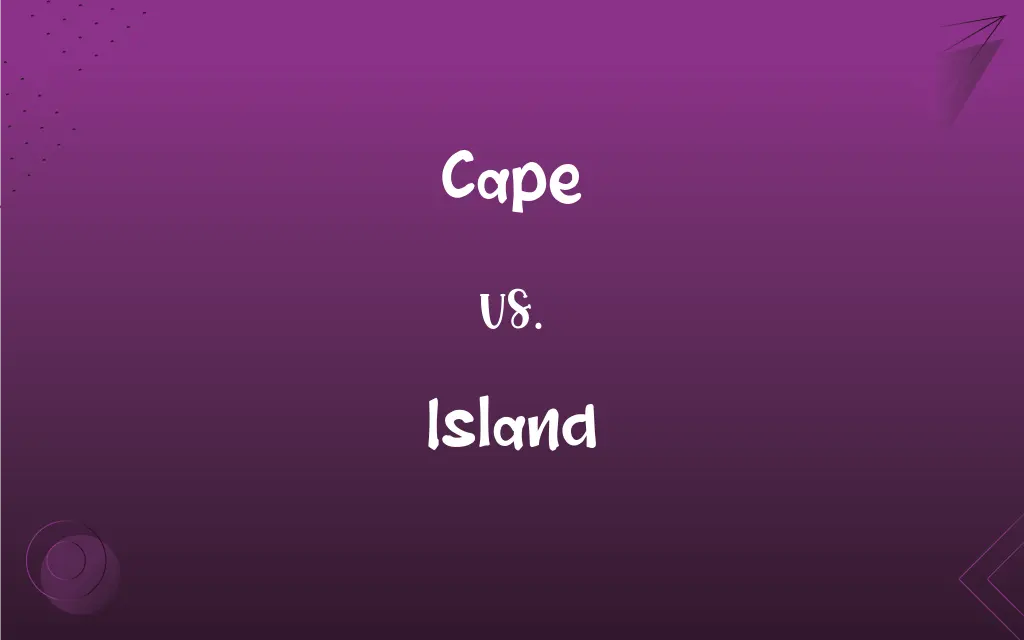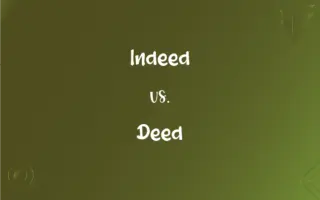Cape vs. Island: What's the Difference?
Edited by Janet White || By Harlon Moss || Updated on November 6, 2023
A cape is a pointed piece of land that sticks out into a sea, ocean, lake, or river; an island is a piece of land surrounded by water.

Key Differences
A cape is a high point of land that extends into a river, lake, or ocean, typically less substantial in land mass than an island. An island, by contrast, is a body of land completely surrounded by water and can support a wide range of habitats and ecosystems.
While a cape is a specific geographical feature marked by its prominent extension into water, creating a distinct point or headland, an island is an isolated landform that can range from a small islet to a large landmass like Greenland.
Both capes and islands can be significant for navigation; capes serve as markers for coastal navigation, whereas islands might be waypoints or destinations in oceanic travel.
The formation of a cape is typically the result of differential erosion, with the harder rock remaining to jut into the water, while islands can be formed through volcanic activity, sediment build-up, or rising sea levels.
Despite their differences, both capes and islands are often characterized by their unique flora and fauna, shaped by the forces of isolation and exposure.
ADVERTISEMENT
Comparison Chart
Geography
Pointed land extending into water
Land surrounded by water
Size
Generally smaller and narrow
Can range from small to large continents
Formation
Often by erosion
Can form by volcanic activity, accretion, uplift
Navigation
Serves as a coastal marker
Can be a waypoint or destination
Ecology
Less diverse ecosystems
Can have diverse ecosystems
ADVERTISEMENT
Cape and Island Definitions
Cape
A narrow piece of land projecting into the water.
The cape was outlined by cliffs that dropped sharply into the ocean.
Island
A piece of land surrounded by water.
The island could be seen on the horizon, a small green oasis in the vast blue sea.
Cape
Often a marked point for maritime pilots.
The lighthouse on the cape has guided ships for over a century.
Island
Can be a habitat for unique species.
On the island, scientists discovered species of birds not found anywhere else.
Cape
A point of land jutting into the sea or a lake.
Sailors used the high cape as a landmark to navigate the coastline.
Island
A landform that can support human habitation.
The island has its own community, complete with a school and a small hospital.
Cape
The tip of a coastal landform.
We hiked to the end of the cape to watch the sunset over the water.
Island
Often a location for resorts or retreats.
They planned a vacation to a tropical island for their anniversary.
Cape
A distinctive land feature that can affect local climate.
The winds around the cape can be treacherous due to its shape and position.
Island
Can be formed by volcanic activity.
The island was actually the top of an underwater volcano.
Cape
A sleeveless outer garment fastened at the throat and worn hanging over the shoulders.
Island
Abbr. Isl. or Is. or I. A landmass, especially one smaller than a continent, entirely surrounded by water.
Cape
A brightly colored cloth used in maneuvering the bull in a bullfight; a capote or muleta.
Island
An unattached kitchen counter providing easy access from all sides.
Cape
A point or head of land projecting into a body of water.
FAQs
Can you live on a cape?
Yes, people can and do live on capes.
Can a cape become an island?
Erosion and rising sea levels can isolate a cape, turning it into an island.
What is an island?
An island is a landform completely surrounded by water.
Can islands have their own lakes?
Yes, islands can have lakes and other bodies of water within them.
How do people use islands?
Islands can be inhabited, used for tourism, scientific study, or left undeveloped.
Are all capes rocky and elevated?
Many are, but capes can also be sandy and flat.
What is a cape?
A cape is a pointed landmass that extends into a sea, ocean, lake, or river.
Are capes always smaller than islands?
Capes are generally smaller and narrower than islands but not always.
Is a peninsula the same as a cape?
No, a peninsula is larger and connected to the mainland, whereas a cape is a pointed projection.
Can islands be man-made?
Yes, there are artificial islands created by humans.
Do islands form only in oceans?
Islands can form in oceans, seas, lakes, and rivers.
Are capes always located at coasts?
Yes, by definition, capes are coastal features.
Can islands be temporary?
Some islands appear and disappear with tides or volcanic activity.
What is the largest island in the world?
Greenland is the largest island in the world.
Can islands be connected to the mainland?
Islands are not connected to the mainland, or they would be peninsulas.
What causes a cape to form?
Capes form due to erosion of the land by water.
Do capes have beaches?
Some capes have beaches while others have cliffs.
Are capes important for ecosystems?
Capes can affect local climates and ecosystems but are not as isolated as islands.
Do capes affect ocean currents?
Capes can influence local currents due to their protrusion into the water.
Are there famous capes?
Yes, Cape Horn and Cape of Good Hope are among the most famous.
About Author
Written by
Harlon MossHarlon is a seasoned quality moderator and accomplished content writer for Difference Wiki. An alumnus of the prestigious University of California, he earned his degree in Computer Science. Leveraging his academic background, Harlon brings a meticulous and informed perspective to his work, ensuring content accuracy and excellence.
Edited by
Janet WhiteJanet White has been an esteemed writer and blogger for Difference Wiki. Holding a Master's degree in Science and Medical Journalism from the prestigious Boston University, she has consistently demonstrated her expertise and passion for her field. When she's not immersed in her work, Janet relishes her time exercising, delving into a good book, and cherishing moments with friends and family.































































